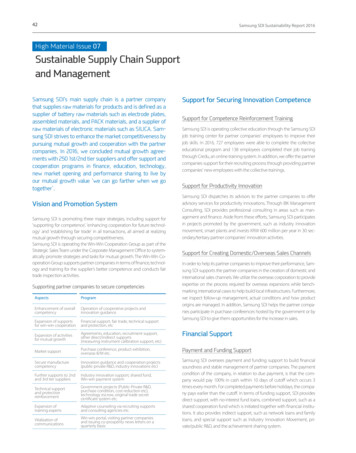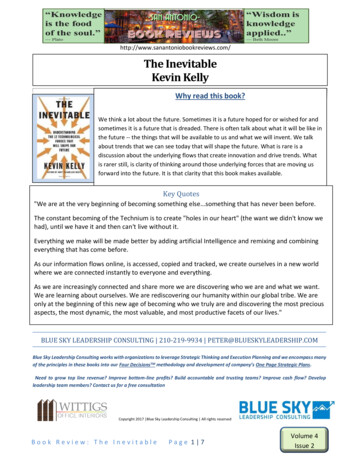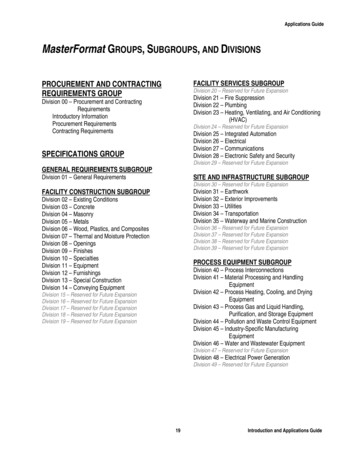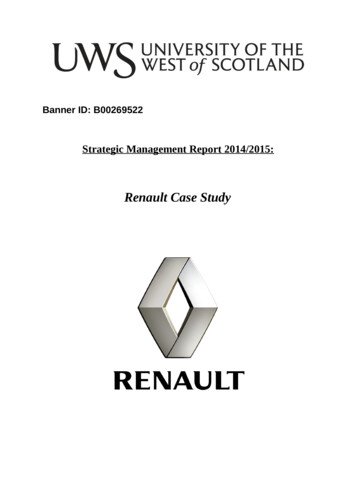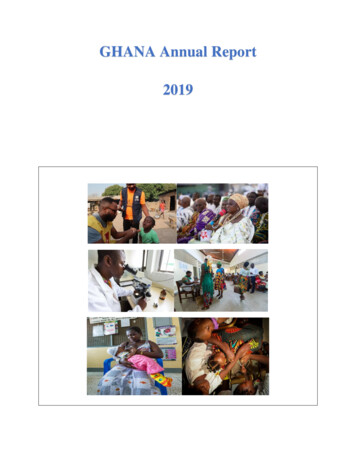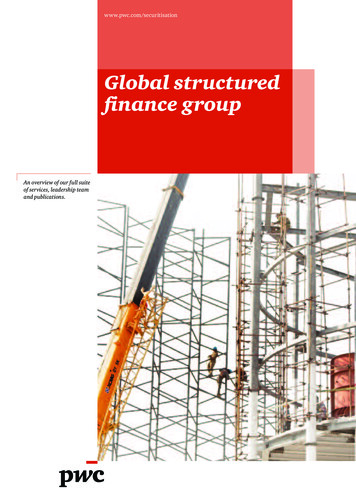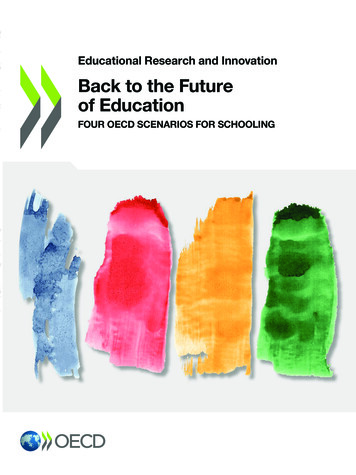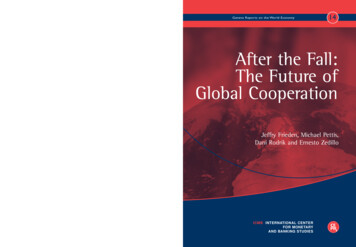
Transcription
ISBN: 978-1-907142-55-0The 14th Geneva Report on the World Economy asks: What are likely to bethe principal issues facing the international economy over the next decade?What could a realistic analysis hope for in the way of progress in confrontingthe problems of the future? What are the constraints imposed by therealities of international and domestic politics? What forms of internationaleconomic cooperation are most important to pursue, and most likely to beachieved?After the Fall: The Future of Global Cooperation Geneva Reports on the World Economy 14The world economy faces its most serious test since the 1930s.The financialcrisis that began in 2007 has yet to run its course, and the immediate futureof global economic activity is not promising. The longer-term future of theinternational economic order is also in doubt, with broad concern abouteverything from financial fragility and recurring macroeconomic imbalancesto stalled trade negotiations and the prospect of currency wars.Geneva Reports on the World EconomyAfter the Fall:The Future ofGlobal CooperationJeffry Frieden, Michael Pettis,Dani Rodrik and Ernesto ZedilloICMB International CenterFor Monetaryand Banking StudiesCentre for Economic Policy ResearchISBN 978-1-907142-55-03rd Floor 77 Bastwick Street LONDON EC1V 3PZ UK TEL: 44 (0)20 7183 8801 FAX: 44 (0)20 7183 8820 EMAIL: cepr@cepr.orgwww.cepr.org9 781907 14255014ICMB International CenterFor Monetaryand Banking Studies
After the Fall: The Future of GlobalCooperationGeneva Reports on the World Economy 14
International Center for Monetary and Banking Studies (ICMB)International Center for Monetary and Banking Studies11A Avenue de la Paix1202 GenevaSwitzerlandTel: (41 22) 734 9548Fax: (41 22) 733 3853Web: www.icmb.ch July 2012 International Center for Monetary and Banking StudiesCentre for Economic Policy ResearchCentre for Economic Policy Research3rd Floor77 Bastwick StreetLondon EC1V 3PZUKTel: 44 (20) 7183 8801Fax: 44 (20) 7183 8820Email: cepr@cepr.orgWeb: www.cepr.orgISBN: 978-1-907142-55-0
After the Fall: The Future of GlobalCooperationGeneva Reports on the World Economy 14Jeffry FriedenHarvard UniversityMichael PettisPeking UniversityDani RodrikHarvard UniversityErnesto ZedilloYale UniversityICMB InternatIonal CenterFor Monetaryand BankIng StudIeSCIMB Centre InternatIonald’etudeS MonetaIreSet BanCaIreS
International Center for Monetary and Banking Studies (ICMB)The International Centre for Monetary and Banking Studies was created in 1973as an independent, non-profit foundation. It is associated with Geneva’s GraduateInstitute of International Studies. Its aim is to foster exchanges of views betweenthe financial sector, central banks and academics on issues of common interest.It is financed through grants from banks, financial institutions and central banks.The Center sponsors international conferences, public lectures, original researchand publications. It has earned a solid reputation in the Swiss and internationalbanking community where it is known for its contribution to bridging the gapbetween theory and practice in the field of international banking and finance.In association with CEPR, the Center launched a new series of Geneva Reportson the World Economy in 1999. The eleven subsequent volumes have attractedconsiderable interest among practitioners, policy-makers and scholars workingon the reform of international financial architecture.The ICMB is non-partisan and does not take any view on policy. Its publications,including the present report, reflect the opinions of the authors, not of ICM orany of its sponsoring institutions.President of the Foundation BoardDirectorThomas JordanCharles WyploszCentre for Economic Policy Research (CEPR)The Centre for Economic Policy Research is a network of over 700 ResearchFellows and Affiliates, based primarily in European universities. The Centrecoordinates the research of its Fellow and Affiliates and communicates the resultsto the public and private sectors. CEPR is an entrepreneur, developing researchinitiatives with the producers, consumers and sponsors of research. Establishedin 1983, CEPR is a European economics research organization with uniquelywide-raning scope and activities.The Centre is pluralist and non-partisan, bringing economic research to bearon the analysis of medium- and long-term policy questions. CEPR research mayinclude views on policy, but the Executive Committee of the Centre does notgive prior review to its publications, and the Centre takes no institutional policypositions. The opinions expressed in this report are those of the authors notthose of the Centre for Economic Policy Research.CEPR is a registered charity (No. 287287) and a company limited by guaranteeand registered in England (No. 1727026).Chair of the BoardPresidentChief Executive OfficerResearch DirectorPolicy DIrectorGuillermo de la DehesaRichard PortesStephen YeoLucrezia ReichlinRichard Baldwin
About the AuthorsJeffry Frieden is Stanfield Professor of International Peace in Harvard University’sDepartment of Government. He specialises in the politics of internationalmonetary and financial relations. Frieden is the author (with Menzie Chinn)of Lost Decades: The Making of America’s Debt Crisis and the Long Recovery (2011).Frieden is also the author of Global Capitalism: Its Fall and Rise in the TwentiethCentury (2006), of Banking on the World: The Politics of American InternationalFinance (1987), of Debt, Development, and Democracy: Modern Political Economyand Latin America, 1965‑1985 (1991), and is the editor or co-editor of over adozen other books on related topics. His articles on the politics of internationaleconomic issues have appeared in a wide variety of scholarly and general-interestpublications.Michael Pettis is a professor at Peking University’s Guanghua School ofManagement, where he specializes in Chinese financial markets. He has alsotaught, from 2002 to 2004, at Tsinghua University’s School of Economics andManagement and, from 1992 to 2001, at Columbia University’s Graduate Schoolof Business.Pettis has worked on Wall Street in trading, capital markets, and corporatefinance since 1987, when he joined the Sovereign Debt trading team atManufacturers Hanover (now JP Morgan). Most recently, from 1996 to 2001,Pettis worked at Bear Stearns, where he was Managing Director-Principal headingthe Latin American Capital Markets and the Liability Management groups.Dani Rodrik is Rafiq Hariri Professor of International Political Economy atHarvard’s John F. Kennedy School of Government. He has published widelyin the areas of economic development, international economics, and politicaleconomy. His most recent book is The Globalization Paradox: Democracy and theFuture of the World Economy (2011).His current research focuses on designing growth strategies for developingeconomies. In 2007 he was awarded the inaugural Albert O. Hirschman Prizeof the Social Sciences Research Council. He is also the recipient of the LeontiefAward for Advancing the Frontiers of Economic Thought. His work has beensupported by research grants from the Carnegie Corporation, Ford Foundation,and Rockefeller Foundation. He teaches courses on economic development andglobalization.v
vi After the Fall: The Future of Global CooperationErnesto Zedillo is the Frederick Iseman ’74 Director of the Yale Center for theStudy of Globalization; Professor in the Field of International Economics andPolitics; Professor of International and Area Studies; and Professor Adjunct ofForestry and Environmental Studies at Yale University. He teaches undergraduatecourses at Yale on debating globalisation, trade, and the economic evolution andchallenges of the Latin American and Caribbean countries. In Mexico, he was withthe Central Bank of Mexico from 1978-1987 then served the National Governmentas Undersecretary of the Budget, Secretary of the Budget and Economic Planning,Secretary of Education, and President (1994-2000). He holds a PhD in Economicsfrom Yale University. In 2011 he was elected as an international member of theAmerican Philosophical Society. Among his edited books are included The Futureof Globalization: Explorations in Light of Recent Turbulence, Global Warming: LookingBeyond Kyoto and Rethinking the “War on Drugs” through the US‑Mexico Prism.
ContentsList of Conference ParticipantsAcknowledgementsForeword1 Introduction: Past Imperfect, Present Tense, Future Conditionalxxvixvii12 The Ghost of Globalisation Past: Lessons for Globalisation Present 52.12.22.3Globalisation pastGlobalisation collapsedLessons from the past3 The Current Situation3.13.23.33.43.53.63.7IntroductionA world out of balanceThe politics of adjustmentEurope on edgeThe China syndromeJapan struggles backRecovery, and then what?4 Global Economic Coordination: On Track or Doomed to isation and governanceG20 risingMomentum unsustainedProblems proliferateWarnings issuedWarnings heeded?Warnings forgottenTrade failingIFI reform on the agendaMultilateral surveillance frustratedPromises, promises Failure explained, but not excused566999111215171819192020212223242526282930
5 The Domestic Political Economy of International EconomicCooperation5.15.25.35.45.5The United StatesThe European UnionChinaBrazilInconvenient truths3334374045466 The Normative Case for Governance of the International Economy496.16.26.36.46.56.66.76.8New modes of global governance?Thinking about global governance: first principlesA quartet of policy problemsPurely domestic policiesGlobal commons policiesBeggar-thy-neighbour policiesBeggar-thyself policiesSummarising the typology7 Macro is the New Trade: Future Problems of the TradeThe challenge of financial regulatory coherenceConflicts over macroeconomic policy and related trade issuesRecurrent global imbalances?Problems of development in the new global environment4951515252535558616162636568748 Looking Ahead81Discussions and Roundtables83References103
List of FiguresFigure 3.1 Changes in unit labour costs and the consumer price index,various Eurozone countries, 2007–2011Figure 3.2 Adjustment in Eurozone and non-Eurozone deficit countries,2007–2011 (current account deficits as a percentage of GDP)Figure 3.3 China’s saving and investment as share of GDPFigure 3.4 Global current account imbalances, as a percentage ofworld GDPFigure 5.1 China’s household consumption and government expenditureas share of GDPFigure 7.1 Growth trends in developed and developing countries,1950–2011Figure 7.2 Developing country growth trends by region, 1950–2011Figure 7.3 Growth rates of GDP per capita of Brazil and Mexico by period1415161842757577List of TablesTable 5.1Table 5.2Table 5.3Table 5.4Table 5.5Table 5.6Table 5.7Table 5.8Most say trade agreements lead to job lossesFew say they have been helped financially by trade agreementsViews of increased trade with ChinaAttitudes towards trade in the US, France and ChinaPublic opinion in the European UnionAttitudes towards trade across countriesViews on national competitive positionViews towards emerging economies3636373940474747
List of Conference ParticipantsEdmond AlphandéryChairmanCNP AssurancesParisLiliana AndonovaProfessor of Political ScienceThe Graduate Institute of International andDevelopment StudiesGenevaRichard ApostolikPresidentGlobal Association of Risk Professionals, IncUSAVit BártaAdvisor to GovernorCzech National BankPragueRémy BersierMember of the Executive BoardBanque Julius Baer & Cie SAGenevaAndrea BianchiProfessor of International LawThe Graduate Institute of International andDevelopment StudiesGenevaThomas BierstekerGasteyger Professor of International SecurityThe Graduate Institute of International andDevelopment StudiesGenevaLaurence BooneChief EconomistBank of America Merrill LynchParisClaudio BorioDeputy Head Monetary and Economic DepartmentDirector of Research and StatisticsBank for International SettlementsBasel
List of Conference Participants xiPascal BorisHead of Territory SwitzerlandBNP Paribas (Suisse) SAGenevaLuigi ButtiglioneHead of Global StrategyBrevan Howard Investment ProductsGenevaVincent ChetailAssociate ProfessorThe Graduate Institute of International andDevelopment StudiesGenevaAndrew ClaphamProfessor of International LawThe Graduate Institute of International andDevelopment StudiesGenevaBenoît CoeuréMember of the Executive BoardEuropean Central BankFrankfurt am MainJean-Pierre DanthineVice-chairman of the Governing BoardSwiss National BankZurichPierre DarierPartnerLombard OdierGenevaAlain de CrombruggheVisiting FellowThe Graduate Institute of International andDevelopment StudiesGenevaJacques DelplaConseil d’Analyse EconomiqueParisPaul DembinskiDirectorObservatoire de la FinanceGenevaAndreas DombretMember of the Executive BoardDeutsche BundesbankFrankfurt am Main
xii After the Fall: The Future of Global CooperationCédric DupontProfessor of Political ScienceDirector, International programmes and ExecutiveEducationThe Graduate Institute of International andDevelopment StudiesGenevaJeffry FriedenProfessor of GovernmentHarvard UniversityCambridgeHans GenbergAssistant DirectorIndependent Evaluation Office of the IMFWashington D.CStefan GerlachDeputy GovernorCentral Bank of IrelandDublinMichel GirardinMember of Senior ManagementUnion Bancaire PrivéeChristos GortsosProfessor of International Economic LawPanteion University of AthensAthensTakatoshi ItoProfessorGraduate School of EconomicsUniversity of TokyoThomas JordanChairman of the Governing BoardSwiss National BankZürichChristian KastropDeputy Director GeneralBundesministerium der FinanzenBerlinPierre KellerFormer Senior PartnerLombard OdierGenevaUlrich KohliProfessorof EconomicsUniversity of GenevaDino KosManaging DirectorHamiltonian Associates, LTDNew York
List of Conference Participants xiiiSigne KrogstrupDeputy Head of Monetary AnalysisSwiss National BankZürichRajiv KumarDirector and Chief ExecutiveIndian Council for Research on InternationalEconomic Relations (ICRIER)Anne Le LorierDeputy GovernorBanque de FranceParisEmmanuelle MerleAssistant Vice-presidentBanque Cantonale de GenèveGenevaMaurice MonbaronMember of the BoardCrédit Agricole (Suisse) SAGenevaJohn MurrayDeputy GovernorBank of CanadaOttawaJosé OcampoProfessorSchool of International and Public AffairsColumbia UniversityNew YorkKatrin OchsenbeinEconomistMacroeconomic Support DivisionSwiss State Secretariat of Economic Affairs (SECO)BernUgo PanizzaChiefDebt and Finance Analysis UnitUNCTADGenevaYung Chul ParkProfessorDivision of International StudiesKorea UniversitySeoulJoost PauwelynProfessor of International LawThe Graduate Institute of International andDevelopment StudiesGeneva
xiv After the Fall: The Future of Global CooperationMichael PettisSenior AssociateCarnegie EndowmentBeijingIvan PictetFormer Senior Managing PartnerPictet & CieGenevaFriederike PohlenzDeputy Head SectionMultilateral AffairsSwiss Federal Department of FinanceBernJonas PontussonProfessor of Political ScienceUniversity of GenevaRichard PortesProfessor of EconomicsLondon Business School and CEPRDavide RodognoProfessor of International HistoryThe Graduate Institute of International andDevelopment StudiesGenevaDani RodrikRafiq Hariri Professor of International PoliticalEconomyHarvard UniversityCambridgeBarbara RoosMember of Senior ManagementNotenstein Private Bank LtdGenevaSalvatore RossiMember of the Governing BoardBank of ItalyRomeJean-Pierre RothChairmanBanque Cantonale de GenèveGenevaAmlan RoyManaging Director, Head of Global Demographic andPensionsFixed Income Research DepartmentCrédit SuisseLondonHans-Joerg RudloffChairmanBarclays CapitalLondon
List of Conference Participants xvNeal SossChief EconomistCrédit SuisseNew-YorkClaudia StirboeckHead of Office of Board MemberDeutsch BundesbankFrankfurt am MainAlexander SwobodaProfessor of Economics EmeritusThe Graduate Institute of International andDevelopment StudiesGenevaCédric TilleProfessor of International EconomicsThe Graduate Institute of International andDevelopment StudiesGenevaMarc UzanExecutive DirectorReinventing Bretton Woods CommitteeParisXin WangChief RepresentativePeople’s Bank of ChinaFrankfurt OfficePawel WyczanskiAdvisorFinancial SystemNational Bank of PolandWarsawCharles WyploszProfessor of International EconomicsThe Graduate Institute of International andDevelopment Studies, GenevaDirector ICMB, GenevaCEPR, LondonJean ZwahlenSenior Adviser for AsiaUnion Bancaire PrivéeGeneva
AcknowledgementsThe authors are grateful to the discussants and to the participants at the GenevaConference of May 2012, where a preliminary version of the present report waspresented and carefully discussed. Particular thanks go to Menzie Chinn, BarryEichengreen, Marina Ivanova and Haynie Wheeler. The discussion section hasbeen prepared by Salvatore Dell’Erba and Katja Mann. Many thanks as well toLaurence Procter who singlehandedly organised the conference and performedall of the background work behind this report.xvi
ForewordInternational cooperation has been a recurrent theme in each of the thirteenGeneva Reports on the World Economy published by CEPR and ICMB since1999. The 2004 report, International Economic and Financial Cooperation: NewIssues, New Actors, New Responses, analysed this issue in some depth. This report,the fourteenth in the series, picks up this issue once again, but this time theapproach is different, the recommendations more cautious and incremental, andthe prognosis bleaker. This is not surprising: the authors demonstrate very clearlywhy international cooperation is difficult at the best of times, and very difficultindeed in the midst of a severe financial crisis.A comparison of the 2012 and the 2004 reports shows clearly what has and hasnot changed as a result of the crisis. The 2004 report was very much concernedwith the machinery of international cooperation, and it argued, very persuasively,for a new set of institutions, including a G4, comprising the US, the Eurozone,Japan and China; and a larger Council for International Financial and EconomicCooperation, comprising no more than 15 members. A G4 has not emerged,although the coordinated crisis management by the Fed, the ECB, the Bank ofJapan and the Bank of England resembled a central bankers’ G4. The G20 whichemerged from the burst of cooperation at the beginning of the crisis is in manyways a somewhat larger version of the Council proposed in the 2004 report.Whether the G20 can sustain its early momentum is less clear, however. Chapter4 of this report, which analyses the experiences of cooperation in recent years,offers a number of reasons to be pessimistic.The latest report looks at international cooperation from a differentperspective; it devotes less attention to the question of institutional machinery,focusing instead on identifying the issues that are most likely to benefit fromcooperation, and on which the international community should focus its efforts.The authors’ argument is very clear: international cooperation is difficult at thebest of times, and these are not the best of times. Governments in the developedcountries, beset by all manner of economic and financial difficulties, lack thepolitical capital to spend on international cooperation; the demands of theirdomestic constituencies are too pressing. Governments in the large emergingeconomies may be under less domestic political pressure and so more inclined tocooperate, but they have very different incentives from their developed countrycounterparts. Cooperative agreements may therefore be difficult in general, andimpossible in some areas. Given this analysis, the authors’ recommendation isxvii
xviii After the Fall: The Future of Global Cooperationlogical and compelling. Since improving international cooperation will be verydifficult for the foreseeable future, governments should concentrate their effortson that issues where the gains are likely to be larger and the difficulties smaller.More precisely, progress is likely to be more difficult in trade policy and financialregulation, and the gains are likely to be smaller; governments should spendtheir political capital on other issues instead. They should focus on improvingmacroeconomic policy coordination as a means of preventing a resurgence ofthe global imbalances that helped trigger the crisis. The only way progress can beachieved is by focusing on a one key issue.Not every reader will agree, but that is not the point. The aim of the GenevaReports is to stimulate informed discussion and debate on issues that matter. Thisthe authors have achieved, and we are grateful to them for their diligence anddedication. We are also grateful to the CEPR Publications team – Anil Shamdasaniand Charlie Anderson – for the smooth and professional way in which they haveprepared the report for publication.Charles WyploszDirector, ICMB18 July 2012Stephen YeoChief Executive Officer, CEPR
1 Introduction: Past Imperfect,Present Tense, FutureConditionalThe world economy faces its most serious test since the 1930s. The financialcrisis that began in 2007 has yet to run its course: in most of the OECD, therecovery is at best halting, while much of the European Union has collapsedinto a second recession and faces a daunting sovereign debt burden, the threatof severe banking crises and the possibility of a break-up of the monetary union.Emerging markets have done better, but their fortunes remain closely connectedto trends in the developed world. The immediate future of global economicactivity is not promising.The longer-term future of the international economic order is also in doubt.Even if the principal economies were to resolve their current financial problemswithout another major disaster, the world economy confronts substantialchallenges. The lack of policy coordination that facilitated the macroeconomicimbalances that led to the crisis still prevails, raising the possibility of a newround of debt accumulation and debt crises. The international financial systemhas demonstrated a fragility that threatens the global economy more generally.Even as more and more developing countries turn to exports to drive theireconomic growth, the appetite of the developed world for these imports seems tobe waning. International financial flows remain at an extraordinarily high level,but there are enduring questions both about whether they contribute as hoped toa more efficient allocation of resources, and about whether they can be sustainedwithout creating another round of bubbles and crashes.Many of these problems require concerted international efforts to addressthem. Calls for better ‘global governance’ reflect the accurate perception thatglobal markets seem to have exceeded the ability of national governments, or adhoc international cooperation, to address the problems to which they may giverise.And yet the structure of international cooperation on economic issues seemsseriously deficient. On some dimensions, such as central bank cooperation, itappears to have worked reasonably well in difficult times.1 But this relative successis almost entirely limited to monetary policy, including specific interventions of1Although some emerging-market governments, such as those of Brazil and China, have complainedthat excessively loose monetary policy in the OECD was ‘exporting inflation’ to the rest of the world.1
2 After the Fall: The Future of Global Cooperationlending of last resort. On virtually every other important global economic issue,international cooperation is stalled, flawed or non-existent.We do not think the very limited successes of attempts at greater globaleconomic governance, although regrettable, are surprising. There are majorbarriers to expanding the realm of international cooperation. This is especiallytrue in the very difficult circumstances of the aftermath of the greatest economiccrisis in several generations.Four interrelated factors make international economic cooperation difficult.First, normative theory is only favourable to global governance in a qualified way,depending upon whether or not international collective action is truly essentialto provide the desired public good. Second, even where the case for collectiveaction is strong, governments face substantial domestic political obstacles toparticipation in global cooperative enterprises. Third, there are substantialdivergences among the goals and attitudes of the major international economicplayers. And, finally, the recent history of cooperative efforts is not particularlyencouraging.The immediate future path of international economic affairs will indeed becomplicated by the fact that the major centres of economic activity are likely tospend much of the coming decade absorbed in difficult attempts to clean up therefuse of the financial crisis, and to find new patterns of economic growth. AsNorth America, Europe and Japan struggle with their own domestic economicand political problems, they are unlikely to be willing or able to expend mucheffort to deal with matters outside their borders even if, for the medium and longterm, it is in their own national interest to do so. Past experience and commonsense show that domestic political support is a prerequisite of meaningfulinternational engagement. A government that cannot count on its constituentsto support its foreign policies will soon either change its policies, or cease to bein government. Partly as a consequence of politicians’ failure to communicate totheir constituencies the benefits of international cooperation, there appears to belimited public support for the measures necessary to expand it.At the same time, the number and character of the relevant internationaleconomic actors is changing. It is hard to imagine serious discussions about trade,finance or exchange rates without including China, Brazil and other emergingeconomies. However, the major emerging economies are at very different placeson the path to global economic and political engagement. Generally, it is notclear that such countries as China, India and Brazil will be willing, able or allowedanytime soon to take a leading role in the management of international economicproblems – for one thing, their interests and perspectives are likely to be verydifferent from those of the incumbents. Even among the emerging economiesthemselves, there are important differences in interests and perspectives thatreflect divergent economic and political structures, conflicting positions in theglobal economy and even, in some cases, a history of mutual suspicion. Theexpanding number of systemically important nations increases both the need forsubstantive cooperation to include those nations, and the difficulty of achievingconsensus among ever more disparate international actors.
Introduction: Past Imperfect, Present Tense, Future Conditional 3As the world struggles to emerge from the most serious crisis since the GreatDepression of the 1930s, then, we must also think about the more distant future.What are likely to be the principal issues facing the international economy overthe next decade? What could a realistic analysis hope for in the way of progressin confronting the problems of the future? What are the constraints imposedby the realities of international and domestic politics? And, most directly forour purposes, what forms of international economic cooperation are the mostimportant to pursue, and most likely to be achieved?2In what follows, we speculate on these matters. We start, in Chapter 2, with aquick summary of some of the lessons of previous experiences with an integratedinternational economy. In Chapter 3, we move to an overview of the currentsituation. We outline the major dangers facing the world economy in the nearterm, and the political and economic stumbling blocks to their resolution.Chapter 4 summarises the recent experience of cooperative ventures in a worldmade more complicated by the entry of new major players, and the persistenceof conflicts of interest and perspectives among the principal powers. Despitecontinued rhetorical commitments to economic cooperation – many falling farshort of any meaningful global governance – the recent history of actual attemptsto implement such cooperation is very chequered, and largely disappointing.Chapter 5 analyses some of the domestic economic and political obstaclesthat explain the limited scope of cooperative ventures. It also argues that themajor players are likely to face continuing domestic political constraints overthe coming decade. All governments require support from their constituents toundertake potentially costly international initiatives; without this support, suchinternational initiatives will face grave difficulties. In Chapter 6, we discuss whatnormative theory would suggest might be desirable in the way of governancestructures to address the global problems outlined in the previous chapters.We ask what sorts of international cooperative measures, institutionalisedor otherwise, might be advantageous, assuming they are attainable. We arguethat the great efforts required to achieve forward movement warrant that theinternational community concentrate on limited but very important issues,topics in which the normative case for global governance is particularly strong.Chapter 7 assumes that the worst-case scenarios are avoided and attempts tosketch the general state of international economic affairs five to seven years fromnow. We attempt to identify the issues that we think will be central to this newphase in the international economic order. Chapter 8 summarises and concludes.We emphasise that cooperation among national governments over globaleconomic problems is more important in certain areas than in others.3 But23Two previous Geneva Reports have focused closely on related issues in international cooperation: DeGregorio et al (1999) and
Frieden is also the author of Global Capitalism: Its Fall and Rise in the Twentieth Century (2006), of Banking on the World: The Politics of American International Finance (1987), of Debt, Development, and Democracy: Modern Political Economy and Latin America, 1


